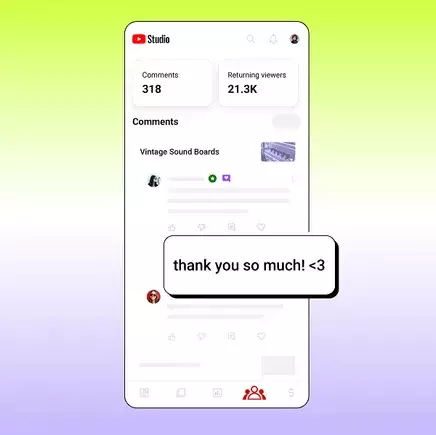In an era dominated by technology, YouTube has recently introduced an innovative yet controversial tool: AI-powered comment reply suggestions aimed at enhancing creator-fan engagement. This new feature allows creators to receive editable reply suggestions that are crafted to reflect their unique tone and style. While such advancements promise to simplify the interaction process, they simultaneously raise questions about the authenticity of online engagement. The integration of artificial intelligence into social media platforms is bound to evoke a mixed bag of opinions, and YouTube’s latest experiment illustrates both the benefits and possible repercussions of automating personal interactions.
YouTube emphasizes that these AI-generated suggestions are designed to learn from the creator’s previous interactions, ostensibly enabling the system to offer responses that resonate with the creator’s established style. This concept may initially appear beneficial, providing users with a quick way to engage with comments, especially for influencers inundated with messages. However, the reliance on AI for communication may foster a dissociation from genuine interactions, transforming heartfelt exchanges into mere transactional responses.
In a world where auto-complete features are commonplace—such as those seen in Gmail—this new tool feels like a logical extension. Yet, it represents a shift from human-centered engagement to algorithm-driven conversation. The potential for creators to rely solely on suggested responses raises concerns about the quality of interaction. Are we moving towards a model of engagement that favors efficiency over authenticity?
Consequences of Automation on Social Media
Critics point out that as AI continues to seep into spaces traditionally occupied by human connection, we may inadvertently deepen the disconnect among users. The essence of social media lies in its ability to foster genuine relationships, allowing creators and fans to communicate in authentic, meaningful ways. The introduction of AI-generated replies raises the specter of ‘fake engagement’—a term that encapsulates interactions that lack sincerity and warmth. This becomes particularly worrisome in a landscape where meaningful connection is paramount for both creators and audiences.
The strategy mirrors trends seen in other platforms, like Meta’s AI chatbot initiative, which allows creators to simulate their conversational style through bots. While these technologies aim to streamline interaction, they also risk rendering genuine communication obsolete. As these practices gain traction, there’s a looming question: could they lead to a mass exodus of users seeking authentic connections?
While automation may alleviate some pressures on content creators—particularly those with large followings—there is a clear distinction between efficiency and authenticity. The desire for creators to connect with their audience quickly must not overshadow the intrinsic value of heartfelt communication. Engaging with fans should not devolve into a rote checking of boxes; rather, it should celebrate the organic, unexpected moments that human interaction allows.
Supporters of the AI initiative argue that time-saving tools could free creators to focus on more meaningful aspects of their content, such as ideation and creation. However, if the creative process becomes overly automated, we risk diluting the very essence of what makes content compelling: the personal touch and unique perspective of each creator.
YouTube has embarked on this trial with a limited group of creators, suggesting a cautious approach to the integration of AI in online engagement. The company aims to gather feedback and potentially expand this feature if it proves successful. Yet, the underlying concern remains: in seeking to enhance user interaction, are platforms like YouTube inadvertently stripping away the human element that lends authenticity to online conversations?
The relationship between AI and social media is poised to deepen, and it is imperative for creators, users, and platforms to strike a balance between technological convenience and genuine engagement. While automation can enhance efficiency, it should never come at the cost of the authenticity that has always been at the core of social media. The true success of these innovations will ultimately hinge on balancing the benefits of technology with the necessity of maintaining meaningful interactions. As the debate continues, one thing remains clear: navigating the intersection of AI and humanity will require careful consideration of what it means to connect in an increasingly automated world.


Leave a Reply